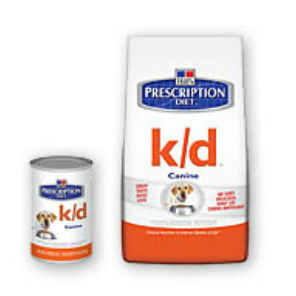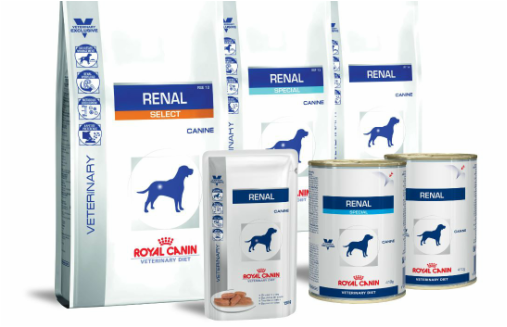The importance of diet
Following the diagnosis of kidney disease a veterinarian may recommend a change of diet. Usually most will recommend converting to a lower protein diet. The ideal is that a diet containing lower but higher quality diet may decrease the stress on the diseased kidneys. The problem with a lower protein diet is that this is sometimes less appealing to the dog. Sometimes a wet canned food can be tried if the low protein kibble is not liked by the dog. The change in diet may need to be done slowly over several days to keep the pet eating. Too low a protein diet can cause the dog to develop protein malnutrition due to loss of protein via the kidney. The success of the new diet needs to be monitored by checking the dog's weight and blood chemistry for signs of anemia and hypoalbuminemia. The amount of protein in the diet needs to be increased if these symptoms occur. Always follow the dietary instructions given to you by your veterinarian.
Dogs should be encouraged to eat enough food to maintain or improve their body condition and to provide all the appropriate levels of nutrition. It might be necessary to split the food over several smaller meals during the day to increase the amount eaten and stimulate the appetite. The palatability of the diet could also be increased by warming the food or by adding small amounts of cottage cheese or yogurt.
If the dog is vomiting because of the renal disease a medication can be given to reduce the level of nausea.
It is essential that the electrolyte balance of the diet is controlled. The intake of phosphorus often needs to be decreased to keep the blood serum levels within the normal ranges. A medication that can reduce the levels of serum phosphate can be used - called a phosphate binder, these can be used when the change of diet and fluid therapy are not enough to keep the phosphorus level within the normal healthy range. All intestinal phosphate binders provide treatment of the food to prevent phosphorus in the diet from being absorbed into the circulation. Aluminum hydroxide or carbonate is commonly used as a cheap and effective intestinal phosphate binder BUT aluminum is toxic as it is retained in the body during chronic kidney disease as the kidneys are the major pathway to excrete absorbed aluminum.
Often the dog may require vitamin D and calcium supplementation. Intake of salt needs to be adequate to help maintain hydration levels and give the food flavour. It has been reported that high levels of salt can cause an increase in blood pressure (hypertension) which could further damage the kidneys. The importance of dietary restriction of sodium is over-rated - as dogs and cats do not have “salt-sensitive” hypertension. Decreased Glomerular filtration rate (GFR) can be one adverse effect of salt restriction.
Potassium levels should be carefully monitored and a supplement given if necessary.
During times of poor appetite it is recommended to supplement the dog with the vitamin B and C. Supplementation of vitamin A and D beyond the minimum daily requirement is not recommended due to a build-up of vitamin A and the changes in the metabolism of vitamin D in renal patients.
The supplementation with omega-3 fatty acid may be of benefit to some animals with chronic renal failure.
With correct treatment, pets with chronic kidney disease may live only months or may live many years. It will all depend on how the body responds to the diet changes and the treatments together with other important factors such as age, other medical conditions and the underlying extent of damage to the kidney.
Dogs should be encouraged to eat enough food to maintain or improve their body condition and to provide all the appropriate levels of nutrition. It might be necessary to split the food over several smaller meals during the day to increase the amount eaten and stimulate the appetite. The palatability of the diet could also be increased by warming the food or by adding small amounts of cottage cheese or yogurt.
If the dog is vomiting because of the renal disease a medication can be given to reduce the level of nausea.
It is essential that the electrolyte balance of the diet is controlled. The intake of phosphorus often needs to be decreased to keep the blood serum levels within the normal ranges. A medication that can reduce the levels of serum phosphate can be used - called a phosphate binder, these can be used when the change of diet and fluid therapy are not enough to keep the phosphorus level within the normal healthy range. All intestinal phosphate binders provide treatment of the food to prevent phosphorus in the diet from being absorbed into the circulation. Aluminum hydroxide or carbonate is commonly used as a cheap and effective intestinal phosphate binder BUT aluminum is toxic as it is retained in the body during chronic kidney disease as the kidneys are the major pathway to excrete absorbed aluminum.
Often the dog may require vitamin D and calcium supplementation. Intake of salt needs to be adequate to help maintain hydration levels and give the food flavour. It has been reported that high levels of salt can cause an increase in blood pressure (hypertension) which could further damage the kidneys. The importance of dietary restriction of sodium is over-rated - as dogs and cats do not have “salt-sensitive” hypertension. Decreased Glomerular filtration rate (GFR) can be one adverse effect of salt restriction.
Potassium levels should be carefully monitored and a supplement given if necessary.
During times of poor appetite it is recommended to supplement the dog with the vitamin B and C. Supplementation of vitamin A and D beyond the minimum daily requirement is not recommended due to a build-up of vitamin A and the changes in the metabolism of vitamin D in renal patients.
The supplementation with omega-3 fatty acid may be of benefit to some animals with chronic renal failure.
With correct treatment, pets with chronic kidney disease may live only months or may live many years. It will all depend on how the body responds to the diet changes and the treatments together with other important factors such as age, other medical conditions and the underlying extent of damage to the kidney.
Owners experience with diets
Rona M Mcleod.
I just wanted to share this, having been living with boxers with JKD since 2007 I've tried most of the food out there with varying results. I was asked by many people after the PDE three years on film went out what food I used and every time I told them VETXX Specific kidney diet. However, it seems they have changed the recipe and now whenever Roxy seats it she throws up what can only be described as couscous!!! So I've moved her on to Royal Canin special renal food, but not the dry or tins, they do sachets and she can't get enough. There's no doubt it's expensive but seems to be working, she had shockingly bad results after needing emergency surgery 5 weeks ago for a pyometra but she's picked up and is almost back to how she was before hand. Worth a try if your looking for a change in food, although not many places are selling it I got it from pet planet with few shipping! Curious to know what everyone else uses and the results. Roxy is now 7 - so I'm very happy!
Barbara Lequeux.
My Vesta is eating Royal Canin renal diet wet and dry, I've asked my vet and was told dry was ok, but for change I also feed her Hill's KD, she does like to change every week, but she's still eating fine. I buy her food on Amazon, but I'm willing to go somewhere else
I just wanted to share this, having been living with boxers with JKD since 2007 I've tried most of the food out there with varying results. I was asked by many people after the PDE three years on film went out what food I used and every time I told them VETXX Specific kidney diet. However, it seems they have changed the recipe and now whenever Roxy seats it she throws up what can only be described as couscous!!! So I've moved her on to Royal Canin special renal food, but not the dry or tins, they do sachets and she can't get enough. There's no doubt it's expensive but seems to be working, she had shockingly bad results after needing emergency surgery 5 weeks ago for a pyometra but she's picked up and is almost back to how she was before hand. Worth a try if your looking for a change in food, although not many places are selling it I got it from pet planet with few shipping! Curious to know what everyone else uses and the results. Roxy is now 7 - so I'm very happy!
Barbara Lequeux.
My Vesta is eating Royal Canin renal diet wet and dry, I've asked my vet and was told dry was ok, but for change I also feed her Hill's KD, she does like to change every week, but she's still eating fine. I buy her food on Amazon, but I'm willing to go somewhere else




